【2025年中考英语一轮教材复习课件】 八年级(上) Unit 3—1【福建中考适用】
文档属性
| 名称 | 【2025年中考英语一轮教材复习课件】 八年级(上) Unit 3—1【福建中考适用】 |
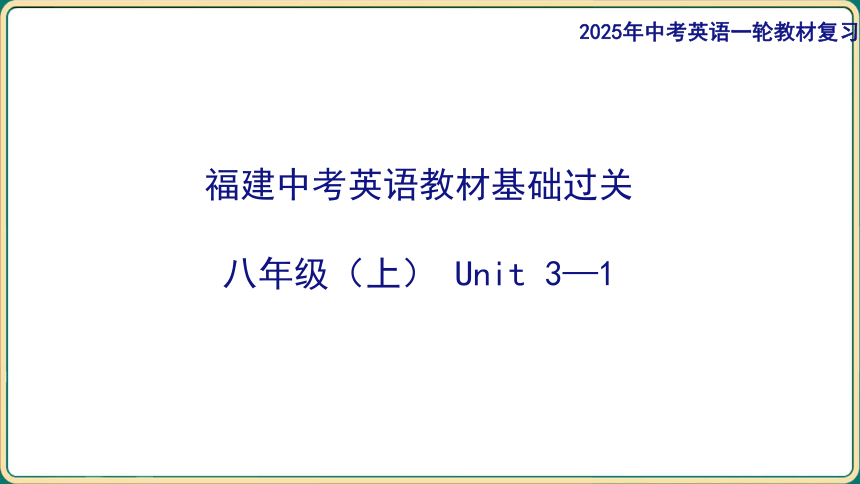
|
|
| 格式 | pptx | ||
| 文件大小 | 628.7KB | ||
| 资源类型 | 试卷 | ||
| 版本资源 | 通用版 | ||
| 科目 | 英语 | ||
| 更新时间 | 2024-12-15 00:00:00 | ||
图片预览

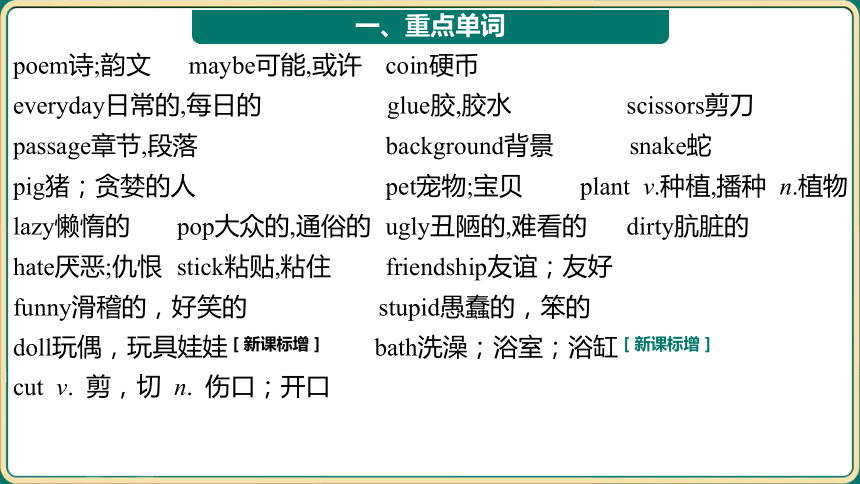
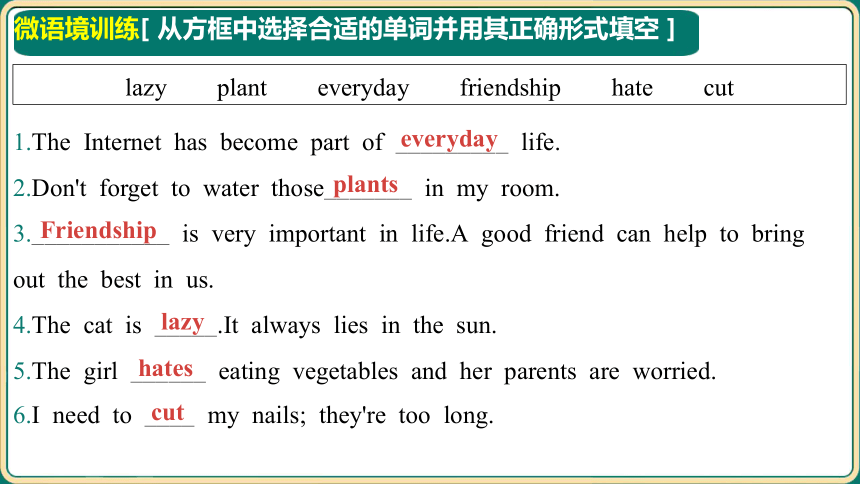
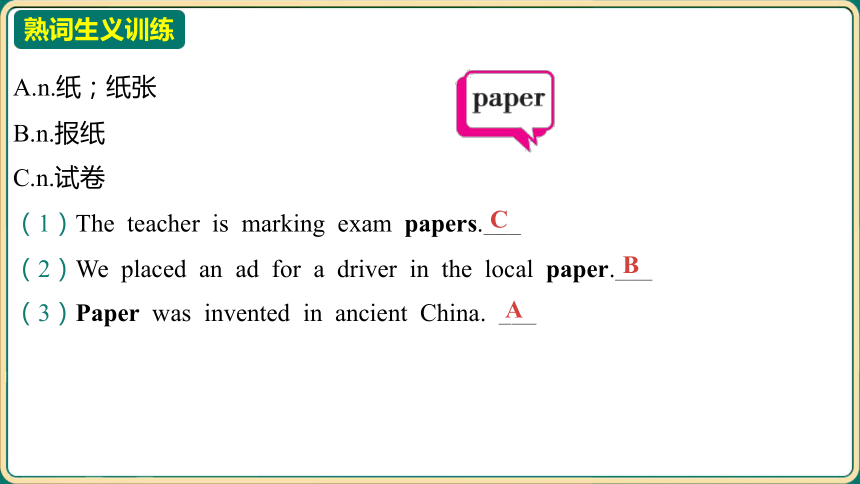
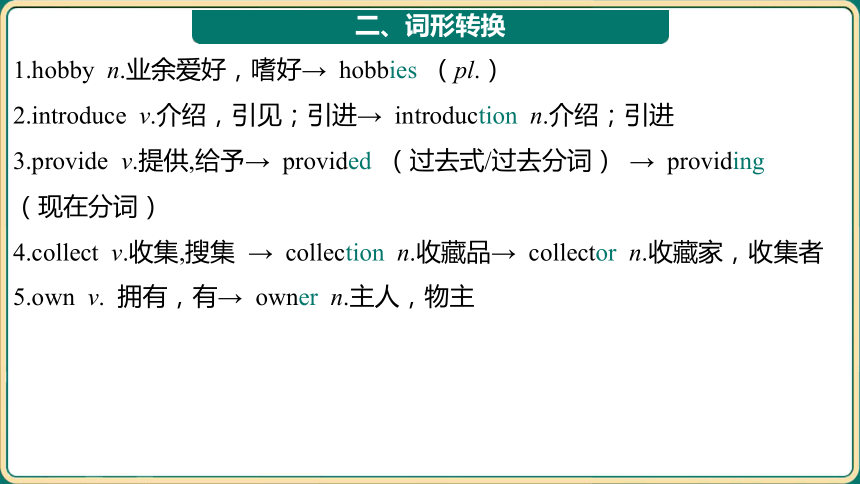
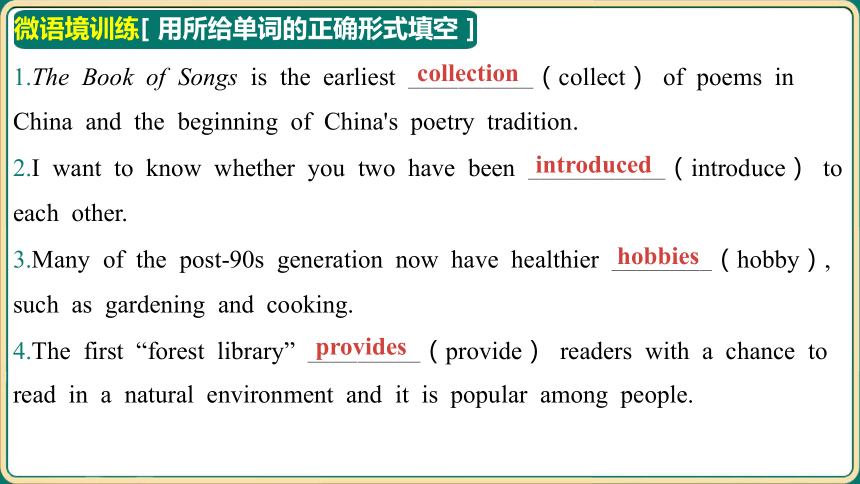
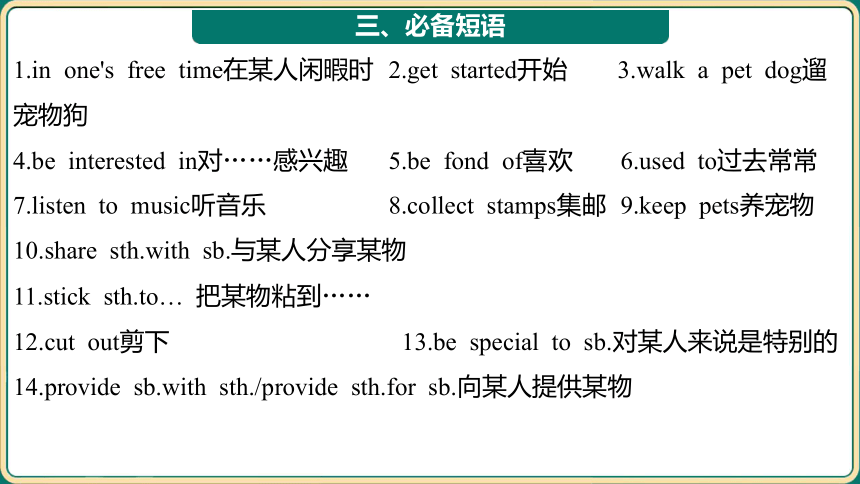
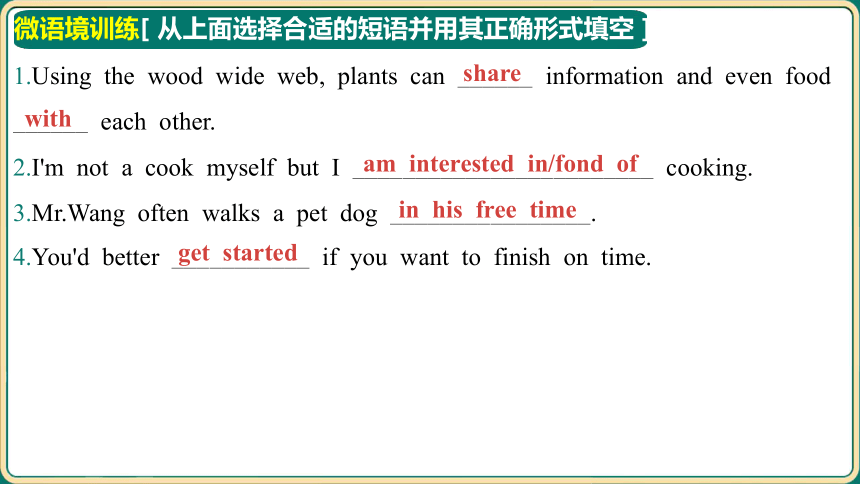
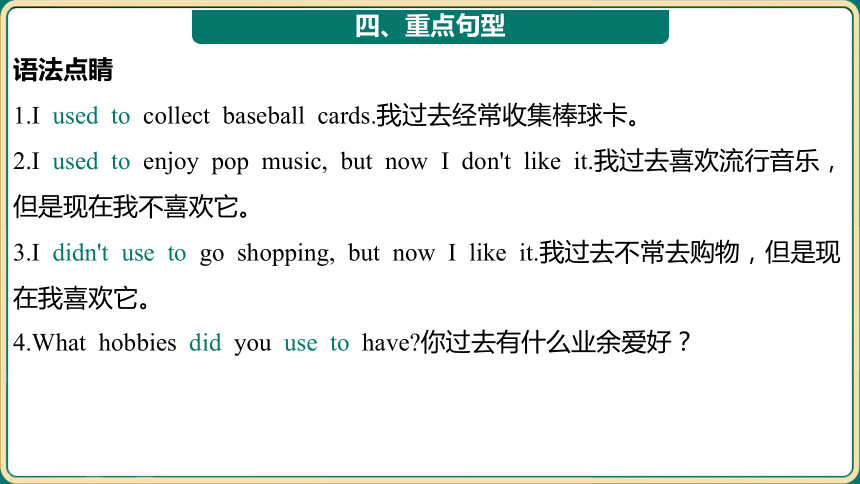
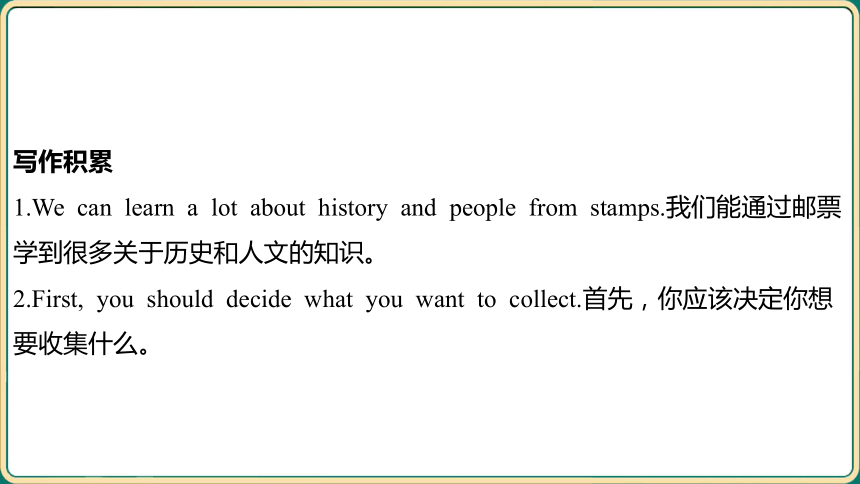
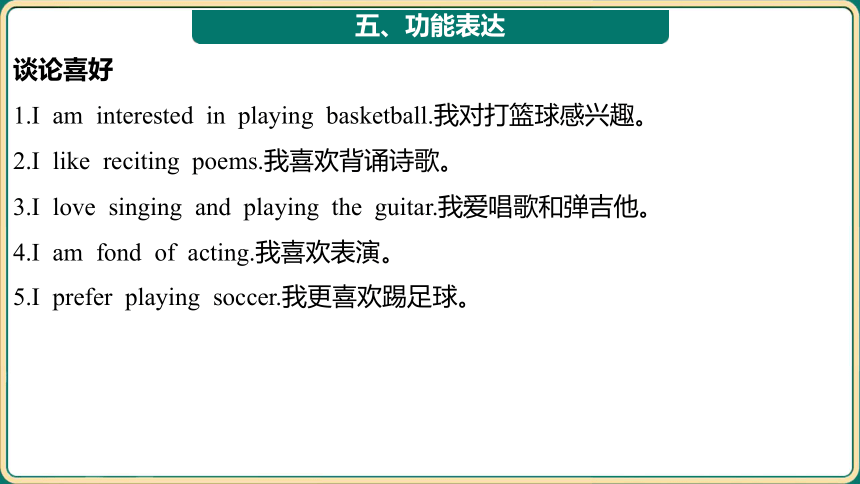
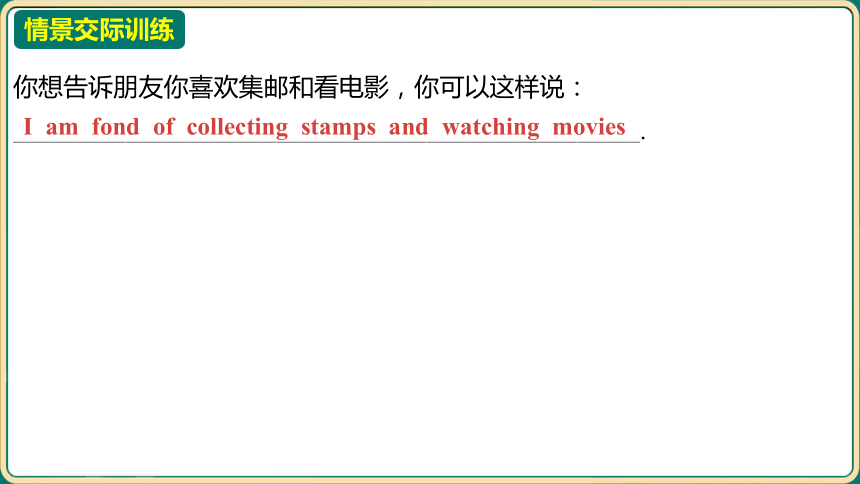
文档简介
(共37张PPT)
福建中考英语教材基础过关
2025年中考英语一轮教材复习
八年级(上) Unit 3—1
一、重点单词
poem诗;韵文 maybe可能,或许 coin硬币
everyday日常的,每日的 glue胶,胶水 scissors剪刀
passage章节,段落 background背景 snake蛇
pig猪;贪婪的人 pet宠物;宝贝 plant v.种植,播种 n.植物
lazy懒惰的 pop大众的,通俗的 ugly丑陋的,难看的 dirty肮脏的
hate厌恶;仇恨 stick粘贴,粘住 friendship友谊;友好
funny滑稽的,好笑的 stupid愚蠢的,笨的
doll玩偶,玩具娃娃[新课标增] bath洗澡;浴室;浴缸[新课标增]
cut v. 剪,切 n. 伤口;开口
微语境训练
[从方框中选择合适的单词并用其正确形式填空]
lazy plant everyday friendship hate cut
1.The Internet has become part of _________ life.
2.Don't forget to water those_______ in my room.
3.___________ is very important in life.A good friend can help to bring
out the best in us.
4.The cat is _____.It always lies in the sun.
5.The girl ______ eating vegetables and her parents are worried.
6.I need to ____ my nails; they're too long.
everyday
plants
Friendship
lazy
hates
cut
熟词生义训练
A.n.纸;纸张
B.n.报纸
C.n.试卷
(1)The teacher is marking exam papers.___
(2)We placed an ad for a driver in the local paper.___
(3)Paper was invented in ancient China. ___
C
B
A
二、词形转换
1.hobby n.业余爱好,嗜好→ hobbies (pl.)
2.introduce v.介绍,引见;引进→ introduction n.介绍;引进
3.provide v.提供,给予→ provided (过去式/过去分词) → providing
(现在分词)
4.collect v.收集,搜集 → collection n.收藏品→ collector n.收藏家,收集者
5.own v. 拥有,有→ owner n.主人,物主
微语境训练
[用所给单词的正确形式填空]
1.The Book of Songs is the earliest __________(collect) of poems in
China and the beginning of China's poetry tradition.
2.I want to know whether you two have been ___________(introduce) to
each other.
3.Many of the post-90s generation now have healthier ________(hobby),
such as gardening and cooking.
4.The first “forest library” _________(provide) readers with a chance to
read in a natural environment and it is popular among people.
collection
introduced
hobbies
provides
三、必备短语
1.in one's free time在某人闲暇时 2.get started开始 3.walk a pet dog遛
宠物狗
4.be interested in对……感兴趣 5.be fond of喜欢 6.used to过去常常
7.listen to music听音乐 8.collect stamps集邮 9.keep pets养宠物
10.share sth.with sb.与某人分享某物
11.stick sth.to… 把某物粘到……
12.cut out剪下 13.be special to sb.对某人来说是特别的
14.provide sb.with sth./provide sth.for sb.向某人提供某物
微语境训练
[从上面选择合适的短语并用其正确形式填空]
1.Using the wood wide web, plants can ______ information and even food
______ each other.
2.I'm not a cook myself but I ________________________ cooking.
3.Mr.Wang often walks a pet dog ________________.
4.You'd better ___________ if you want to finish on time.
share
with
am interested in/fond of
in his free time
get started
四、重点句型
语法点睛
1.I used to collect baseball cards.我过去经常收集棒球卡。
2.I used to enjoy pop music, but now I don't like it.我过去喜欢流行音乐,
但是现在我不喜欢它。
3.I didn't use to go shopping, but now I like it.我过去不常去购物,但是现
在我喜欢它。
4.What hobbies did you use to have 你过去有什么业余爱好?
写作积累
1.We can learn a lot about history and people from stamps.我们能通过邮票
学到很多关于历史和人文的知识。
2.First, you should decide what you want to collect.首先,你应该决定你想
要收集什么。
五、功能表达
谈论喜好
1.I am interested in playing basketball.我对打篮球感兴趣。
2.I like reciting poems.我喜欢背诵诗歌。
3.I love singing and playing the guitar.我爱唱歌和弹吉他。
4.I am fond of acting.我喜欢表演。
5.I prefer playing soccer.我更喜欢踢足球。
情景交际训练
你想告诉朋友你喜欢集邮和看电影,你可以这样说:
__________________________________________________.
I am fond of collecting stamps and watching movies
重难点1 be fond of, enjoy, prefer, like/love与be interested in
I'm fond of going traveling.我喜欢去旅游。
词(组) 含义 用法
be fond of “喜欢”,对象为人或事物 be fond of sb./sth.喜欢某人/某物
be fond of doing sth.喜欢做某事
enjoy “喜欢,欣赏”,指在某种活 动中获得乐趣 enjoy sth.喜欢某物
enjoy doing sth.喜欢做某事
词(组) 含义 用法
prefer “更喜欢”,指在两者中更喜欢其中的一个 prefer (to do/doing) sth.更喜欢
(做)某事
prefer (doing) A to (doing)
B喜欢(做)A甚于喜欢(做)B
prefer to do A rather than do B
喜欢做A而不喜欢做B
like/love “喜欢,爱”,侧重性格和习惯上的爱好 like/love doing sth.喜欢做某事
like/love to do sth.喜欢做某事
be interested in 对……感兴趣 be interested in (doing) sth.对(做)某事感兴趣
提分特训
1.love, poem _____________________________
The boy loves reading poems.
2.be interested in _______________________________________________
The man is interested in climbing hills/mountains.
3.be fond of ___________________________
The girl is fond of skating.
4.family, enjoy __________________________________________
The family are enjoying the beautiful moon.
重难点2 provide, offer与give
All pets provide their owners with love and comfort in their lives.
所有的宠物在生活中给予它们的主人爱和安慰。
词汇 含义 用法
provide 提供,给予 provide sb.with sth.=provide sth.for sb.向某人提供
某物
offer 提供(东西或机会);主动提出 offer sb.sth.=offer sth.to sb.向某人提供某物;offer
to do sth.主动提出做某事
give 给;赠送 give sb.sth.= give sth.to sb.给某人某物
提分特训
用适当的介词填空
5.I think breakfast is the most important meal of the day.It provides energy
____ us after a long night without food.
6.China is offering a great deal of medical help ___ the world.
7.Project Hope has provided children from poor families ______ the chance
to go to school since 1989.
8.The lady gave her thanks ___ the boy who had helped her wash the car.
for
to
with
to
语法点 used to
(1)used to的用法
used to表示“过去常常;曾经”,常见的句式结构如下:
He used to be tall.他以前很高。
He didn't use to be tall.他以前不高。
—Did he use to be tall 他以前高吗?
—Yes, he did.是的,他以前高。
(2)辨析used to do sth., get/be used to doing sth.与be used to do
sth./be used for doing sth.
用法
used to do sth. 意为“过去常常做某事”,表示过去习惯性、经常性
的动作或状态,暗示现在不做了。
get/be used to doing sth. 意为“习惯于做某事”,to为介词,后跟名词、代词或
动名词
be used to do sth./be used for doing sth. 意为“被用来做某事”
易失分点
(1)used to 通常不与表示具体次数(如 twice, three times 等)或一
段时间(如 three months, five years 等)的词或短语连用。如:
我去过巴黎 3 次。
( ) I have been to Paris three times.
( ) I used to go to Paris three times.
(2)可以用always, often, sometimes等副词作used to的状语,仍然指过
去的习惯,不是现在的习惯。如:
He always used to be late for class.他过去总是上课迟到。
√
×
提分特训
1.used to ________________________
He used to be a doctor.
2.Gina以前晚饭后经常和她父母看电视,但现在她习惯散步了。
Gina __________________ with her parents after dinner, but now she
________________________.
used to watch TV
is used to taking a walk
3.这笔钱将被用来给贫困地区的孩子们买书。
The money ______________________________________________________
for children in poor areas.
will be used to buy books/will be used for buying books
基础练
Ⅰ.选择填空
1.A happy family provides a loving environment ___ children.
A
A.for B.with C.in
2.Billy showed me the article he'd ___ of the magazine.
C
A.set out B.put out C.cut out
3.—What kind of program do you like
—I used to ______ Human and Nature.As I grow older, I am used to
______ the news.( )
A
A.watch; watching B.watching; watch C.watch; watch
4.My pet cat is ___.It spends most of the time sleeping every day.
B
A.clever B.lazy C.dirty
5.If you treat others with your heart, you will get ___ in return.
C
A.background B.introduction C.friendship
6.Julia ___ swimming, because she thinks it is dangerous.
A
A.hates B.enjoys C.plans
7.—What do you think of the movie you saw last night
—It was so___.I couldn't stop laughing when seeing it.
B
A.boring B.funny C.moving
8.We all know that Li Bai wrote a lot of___ in his whole life.He is one of
the greatest poets in history.
C
A.novels B.songs C.poems
Ⅱ.情景交际
1.你想知道朋友过去经常在春天做什么,可以这样问:
_________________________________
2.你想告诉朋友你对唱流行歌曲感兴趣,可以这样问:
___________________________________.
What did you use to do in spring
I am interested in singing pop songs
3.你想问Judy她的爱好是什么,可以这样说:
____________________, Judy
What is your hobby
4.你想建议朋友出去做一些户外活动,可以这样说:
Why________________________________________
not go out and do some outdoor activities
5.你觉得Alice画的画很漂亮,可以这样赞叹:
________________________________!
What a beautiful picture(it is)
Ⅲ.看图写话
1.be fond of, Lily_________________
___________________
Lily is fond of collecting stamps.
2.after dinner______________________
___________________
The man/He walks his dog after dinner.
3.often, in winter _________________
______________________
They often make a snowman in winter.
4.yesterday ________________________________
They planted a flower yesterday.
5.if, tomorrow ___________________________________________________
If it is sunny/windy tomorrow, the boy will fly a kite.
提升练
Ⅳ.阅读理解
[2024泸州中考] Anna Mary Robertson was a famous American
painter.It is often said that Anna first took up painting when she was nearly
80 years old.In fact, when she was a little girl, she drew whenever she had
a chance.
Long before she became known, Anna lived a life full of challenges.
She always kept busy with farm chores, housework, and children, but she
never really stopped pursuing (追求) art.
In Anna's late age, she pictured some scenes in her mind before
painting.She would close her eyes and recall a happy time from her early
life.She would remember helping her father on the farm.She would see the
people, the farm buildings, and the animals.She would imagine the blue
mountains and the softly falling snow.
Anna's friends and family members loved the paintings.She gave them
away as gifts.A friend hung several of the paintings in a local store.One
day a stranger came into the store and bought every one of her
paintings.He took her paintings to New York City and showed them to
some art collectors.One of these collectors, Dr.Kallir, liked the paintings.He
hung some of them in his gallery (画廊).The newspaper did a story
about the art show.The reporter called Anna “Grandma Moses”.From then
on almost everyone called her that way.Grandma Moses kept on
painting.Her paintings got better, and they got more popular.
In her lifetime, she created about 1,500 works of art.They were
cheerful, warm and full of life, just like Grandma herself.Her paintings still
remain popular today.
“As I look back on my life, it's like a good day's work.It was done
and I feel satisfied with it.I knew nothing better than painting and made
full use of what life offered.And life is what we make it, always has been,
always will be,” she said.
1.When did Anna first take up painting ( )
A
A.When she was a little girl.
B.When she was about 80 years old.
C.When she saw the blue mountains.
D.When she helped her father on the farm.
2.According to Paragraph 3, what's the main theme of Anna's
paintings ( )
C
A.Farming. B.Animals.
C.Country life. D.Family members.
3.What's the correct order of the following events ( )
B
①Anna was known to the public.
②Anna's friends received her paintings as gifts.
③An art show about Anna's paintings was reported.
④A man brought Anna's paintings to New York City.
A.②④①③ B.②④③① C.①④②③ D.①④③②
4.Which of the following words can best describe Anna ( )
D
A.Honest and friendly. B.Outgoing and independent.
C.Clever and well-educated. D.Creative and hard-working.
5.In which part of a magazine can we read this passage ( )
B
A.Language and culture. B.Art and people.
C.Nature and environment. D.Science and technology.
Ⅴ.短文填空
[2024南充中考] Jiang Shumei, born in 1937, spent most of her time
working in a factory.In 1996, she learned her 1._____ (one)Chinese
character(汉字).Sixteen years later, she started to write down some of her
own 2._______ (story).It was not easy.Sometimes, completing a single
sentence could take a day.She 3.________ (usual) started at 3 or 4 a.m.,
and revised(修改)the pieces several times until she was 4._________
(satisfy).
In 2013, her book, Time of Trouble, Time of Poverty, was published
and proved to be 5.___ success.The book earned Jiang a lot of fans and
first
stories
usually
satisfied
a
sympathy(同情).“Don't feel sorry for me,” she says to her fans.“The
hardships mentioned in the book are now in the past.6._________ them, I
could never have finished this book.”
So far, the elderly woman has 7.__________(publish)six books,
totaling more than 600,000 characters in length.“It's never too late.I enjoy
8._______(I) when writing,” Jiang says.She lives a healthy life,
exercising every day 9._____ eating a balanced diet.“If I could live as long
as 130, would you still say that it 10.___ (be) too late for me to start
after 60 ” she says jokingly.
Without
published
myself
and
is
福建中考英语教材基础过关
2025年中考英语一轮教材复习
八年级(上) Unit 3—1
一、重点单词
poem诗;韵文 maybe可能,或许 coin硬币
everyday日常的,每日的 glue胶,胶水 scissors剪刀
passage章节,段落 background背景 snake蛇
pig猪;贪婪的人 pet宠物;宝贝 plant v.种植,播种 n.植物
lazy懒惰的 pop大众的,通俗的 ugly丑陋的,难看的 dirty肮脏的
hate厌恶;仇恨 stick粘贴,粘住 friendship友谊;友好
funny滑稽的,好笑的 stupid愚蠢的,笨的
doll玩偶,玩具娃娃[新课标增] bath洗澡;浴室;浴缸[新课标增]
cut v. 剪,切 n. 伤口;开口
微语境训练
[从方框中选择合适的单词并用其正确形式填空]
lazy plant everyday friendship hate cut
1.The Internet has become part of _________ life.
2.Don't forget to water those_______ in my room.
3.___________ is very important in life.A good friend can help to bring
out the best in us.
4.The cat is _____.It always lies in the sun.
5.The girl ______ eating vegetables and her parents are worried.
6.I need to ____ my nails; they're too long.
everyday
plants
Friendship
lazy
hates
cut
熟词生义训练
A.n.纸;纸张
B.n.报纸
C.n.试卷
(1)The teacher is marking exam papers.___
(2)We placed an ad for a driver in the local paper.___
(3)Paper was invented in ancient China. ___
C
B
A
二、词形转换
1.hobby n.业余爱好,嗜好→ hobbies (pl.)
2.introduce v.介绍,引见;引进→ introduction n.介绍;引进
3.provide v.提供,给予→ provided (过去式/过去分词) → providing
(现在分词)
4.collect v.收集,搜集 → collection n.收藏品→ collector n.收藏家,收集者
5.own v. 拥有,有→ owner n.主人,物主
微语境训练
[用所给单词的正确形式填空]
1.The Book of Songs is the earliest __________(collect) of poems in
China and the beginning of China's poetry tradition.
2.I want to know whether you two have been ___________(introduce) to
each other.
3.Many of the post-90s generation now have healthier ________(hobby),
such as gardening and cooking.
4.The first “forest library” _________(provide) readers with a chance to
read in a natural environment and it is popular among people.
collection
introduced
hobbies
provides
三、必备短语
1.in one's free time在某人闲暇时 2.get started开始 3.walk a pet dog遛
宠物狗
4.be interested in对……感兴趣 5.be fond of喜欢 6.used to过去常常
7.listen to music听音乐 8.collect stamps集邮 9.keep pets养宠物
10.share sth.with sb.与某人分享某物
11.stick sth.to… 把某物粘到……
12.cut out剪下 13.be special to sb.对某人来说是特别的
14.provide sb.with sth./provide sth.for sb.向某人提供某物
微语境训练
[从上面选择合适的短语并用其正确形式填空]
1.Using the wood wide web, plants can ______ information and even food
______ each other.
2.I'm not a cook myself but I ________________________ cooking.
3.Mr.Wang often walks a pet dog ________________.
4.You'd better ___________ if you want to finish on time.
share
with
am interested in/fond of
in his free time
get started
四、重点句型
语法点睛
1.I used to collect baseball cards.我过去经常收集棒球卡。
2.I used to enjoy pop music, but now I don't like it.我过去喜欢流行音乐,
但是现在我不喜欢它。
3.I didn't use to go shopping, but now I like it.我过去不常去购物,但是现
在我喜欢它。
4.What hobbies did you use to have 你过去有什么业余爱好?
写作积累
1.We can learn a lot about history and people from stamps.我们能通过邮票
学到很多关于历史和人文的知识。
2.First, you should decide what you want to collect.首先,你应该决定你想
要收集什么。
五、功能表达
谈论喜好
1.I am interested in playing basketball.我对打篮球感兴趣。
2.I like reciting poems.我喜欢背诵诗歌。
3.I love singing and playing the guitar.我爱唱歌和弹吉他。
4.I am fond of acting.我喜欢表演。
5.I prefer playing soccer.我更喜欢踢足球。
情景交际训练
你想告诉朋友你喜欢集邮和看电影,你可以这样说:
__________________________________________________.
I am fond of collecting stamps and watching movies
重难点1 be fond of, enjoy, prefer, like/love与be interested in
I'm fond of going traveling.我喜欢去旅游。
词(组) 含义 用法
be fond of “喜欢”,对象为人或事物 be fond of sb./sth.喜欢某人/某物
be fond of doing sth.喜欢做某事
enjoy “喜欢,欣赏”,指在某种活 动中获得乐趣 enjoy sth.喜欢某物
enjoy doing sth.喜欢做某事
词(组) 含义 用法
prefer “更喜欢”,指在两者中更喜欢其中的一个 prefer (to do/doing) sth.更喜欢
(做)某事
prefer (doing) A to (doing)
B喜欢(做)A甚于喜欢(做)B
prefer to do A rather than do B
喜欢做A而不喜欢做B
like/love “喜欢,爱”,侧重性格和习惯上的爱好 like/love doing sth.喜欢做某事
like/love to do sth.喜欢做某事
be interested in 对……感兴趣 be interested in (doing) sth.对(做)某事感兴趣
提分特训
1.love, poem _____________________________
The boy loves reading poems.
2.be interested in _______________________________________________
The man is interested in climbing hills/mountains.
3.be fond of ___________________________
The girl is fond of skating.
4.family, enjoy __________________________________________
The family are enjoying the beautiful moon.
重难点2 provide, offer与give
All pets provide their owners with love and comfort in their lives.
所有的宠物在生活中给予它们的主人爱和安慰。
词汇 含义 用法
provide 提供,给予 provide sb.with sth.=provide sth.for sb.向某人提供
某物
offer 提供(东西或机会);主动提出 offer sb.sth.=offer sth.to sb.向某人提供某物;offer
to do sth.主动提出做某事
give 给;赠送 give sb.sth.= give sth.to sb.给某人某物
提分特训
用适当的介词填空
5.I think breakfast is the most important meal of the day.It provides energy
____ us after a long night without food.
6.China is offering a great deal of medical help ___ the world.
7.Project Hope has provided children from poor families ______ the chance
to go to school since 1989.
8.The lady gave her thanks ___ the boy who had helped her wash the car.
for
to
with
to
语法点 used to
(1)used to的用法
used to表示“过去常常;曾经”,常见的句式结构如下:
He used to be tall.他以前很高。
He didn't use to be tall.他以前不高。
—Did he use to be tall 他以前高吗?
—Yes, he did.是的,他以前高。
(2)辨析used to do sth., get/be used to doing sth.与be used to do
sth./be used for doing sth.
用法
used to do sth. 意为“过去常常做某事”,表示过去习惯性、经常性
的动作或状态,暗示现在不做了。
get/be used to doing sth. 意为“习惯于做某事”,to为介词,后跟名词、代词或
动名词
be used to do sth./be used for doing sth. 意为“被用来做某事”
易失分点
(1)used to 通常不与表示具体次数(如 twice, three times 等)或一
段时间(如 three months, five years 等)的词或短语连用。如:
我去过巴黎 3 次。
( ) I have been to Paris three times.
( ) I used to go to Paris three times.
(2)可以用always, often, sometimes等副词作used to的状语,仍然指过
去的习惯,不是现在的习惯。如:
He always used to be late for class.他过去总是上课迟到。
√
×
提分特训
1.used to ________________________
He used to be a doctor.
2.Gina以前晚饭后经常和她父母看电视,但现在她习惯散步了。
Gina __________________ with her parents after dinner, but now she
________________________.
used to watch TV
is used to taking a walk
3.这笔钱将被用来给贫困地区的孩子们买书。
The money ______________________________________________________
for children in poor areas.
will be used to buy books/will be used for buying books
基础练
Ⅰ.选择填空
1.A happy family provides a loving environment ___ children.
A
A.for B.with C.in
2.Billy showed me the article he'd ___ of the magazine.
C
A.set out B.put out C.cut out
3.—What kind of program do you like
—I used to ______ Human and Nature.As I grow older, I am used to
______ the news.( )
A
A.watch; watching B.watching; watch C.watch; watch
4.My pet cat is ___.It spends most of the time sleeping every day.
B
A.clever B.lazy C.dirty
5.If you treat others with your heart, you will get ___ in return.
C
A.background B.introduction C.friendship
6.Julia ___ swimming, because she thinks it is dangerous.
A
A.hates B.enjoys C.plans
7.—What do you think of the movie you saw last night
—It was so___.I couldn't stop laughing when seeing it.
B
A.boring B.funny C.moving
8.We all know that Li Bai wrote a lot of___ in his whole life.He is one of
the greatest poets in history.
C
A.novels B.songs C.poems
Ⅱ.情景交际
1.你想知道朋友过去经常在春天做什么,可以这样问:
_________________________________
2.你想告诉朋友你对唱流行歌曲感兴趣,可以这样问:
___________________________________.
What did you use to do in spring
I am interested in singing pop songs
3.你想问Judy她的爱好是什么,可以这样说:
____________________, Judy
What is your hobby
4.你想建议朋友出去做一些户外活动,可以这样说:
Why________________________________________
not go out and do some outdoor activities
5.你觉得Alice画的画很漂亮,可以这样赞叹:
________________________________!
What a beautiful picture(it is)
Ⅲ.看图写话
1.be fond of, Lily_________________
___________________
Lily is fond of collecting stamps.
2.after dinner______________________
___________________
The man/He walks his dog after dinner.
3.often, in winter _________________
______________________
They often make a snowman in winter.
4.yesterday ________________________________
They planted a flower yesterday.
5.if, tomorrow ___________________________________________________
If it is sunny/windy tomorrow, the boy will fly a kite.
提升练
Ⅳ.阅读理解
[2024泸州中考] Anna Mary Robertson was a famous American
painter.It is often said that Anna first took up painting when she was nearly
80 years old.In fact, when she was a little girl, she drew whenever she had
a chance.
Long before she became known, Anna lived a life full of challenges.
She always kept busy with farm chores, housework, and children, but she
never really stopped pursuing (追求) art.
In Anna's late age, she pictured some scenes in her mind before
painting.She would close her eyes and recall a happy time from her early
life.She would remember helping her father on the farm.She would see the
people, the farm buildings, and the animals.She would imagine the blue
mountains and the softly falling snow.
Anna's friends and family members loved the paintings.She gave them
away as gifts.A friend hung several of the paintings in a local store.One
day a stranger came into the store and bought every one of her
paintings.He took her paintings to New York City and showed them to
some art collectors.One of these collectors, Dr.Kallir, liked the paintings.He
hung some of them in his gallery (画廊).The newspaper did a story
about the art show.The reporter called Anna “Grandma Moses”.From then
on almost everyone called her that way.Grandma Moses kept on
painting.Her paintings got better, and they got more popular.
In her lifetime, she created about 1,500 works of art.They were
cheerful, warm and full of life, just like Grandma herself.Her paintings still
remain popular today.
“As I look back on my life, it's like a good day's work.It was done
and I feel satisfied with it.I knew nothing better than painting and made
full use of what life offered.And life is what we make it, always has been,
always will be,” she said.
1.When did Anna first take up painting ( )
A
A.When she was a little girl.
B.When she was about 80 years old.
C.When she saw the blue mountains.
D.When she helped her father on the farm.
2.According to Paragraph 3, what's the main theme of Anna's
paintings ( )
C
A.Farming. B.Animals.
C.Country life. D.Family members.
3.What's the correct order of the following events ( )
B
①Anna was known to the public.
②Anna's friends received her paintings as gifts.
③An art show about Anna's paintings was reported.
④A man brought Anna's paintings to New York City.
A.②④①③ B.②④③① C.①④②③ D.①④③②
4.Which of the following words can best describe Anna ( )
D
A.Honest and friendly. B.Outgoing and independent.
C.Clever and well-educated. D.Creative and hard-working.
5.In which part of a magazine can we read this passage ( )
B
A.Language and culture. B.Art and people.
C.Nature and environment. D.Science and technology.
Ⅴ.短文填空
[2024南充中考] Jiang Shumei, born in 1937, spent most of her time
working in a factory.In 1996, she learned her 1._____ (one)Chinese
character(汉字).Sixteen years later, she started to write down some of her
own 2._______ (story).It was not easy.Sometimes, completing a single
sentence could take a day.She 3.________ (usual) started at 3 or 4 a.m.,
and revised(修改)the pieces several times until she was 4._________
(satisfy).
In 2013, her book, Time of Trouble, Time of Poverty, was published
and proved to be 5.___ success.The book earned Jiang a lot of fans and
first
stories
usually
satisfied
a
sympathy(同情).“Don't feel sorry for me,” she says to her fans.“The
hardships mentioned in the book are now in the past.6._________ them, I
could never have finished this book.”
So far, the elderly woman has 7.__________(publish)six books,
totaling more than 600,000 characters in length.“It's never too late.I enjoy
8._______(I) when writing,” Jiang says.She lives a healthy life,
exercising every day 9._____ eating a balanced diet.“If I could live as long
as 130, would you still say that it 10.___ (be) too late for me to start
after 60 ” she says jokingly.
Without
published
myself
and
is
